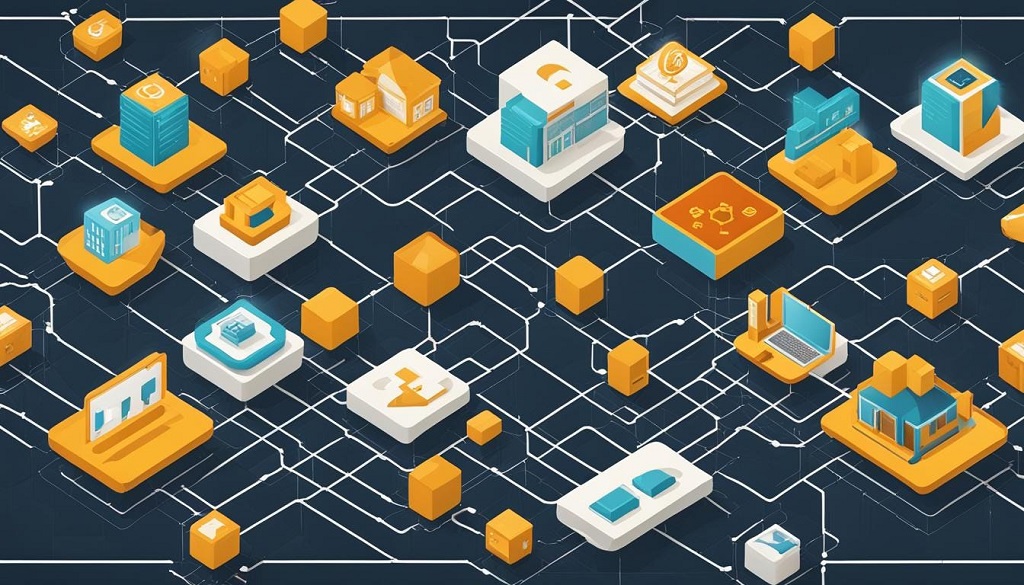Blockchain technology has become a buzzword, often associated with cryptocurrencies like Bitcoin. But beyond the world of digital coins lies a powerful innovation with the potential to revolutionize various aspects of our lives. This article explores the practical applications of blockchain, delving into how it can tackle real-world problems and enhance security, transparency, and efficiency across diverse sectors. We’ll also address some limitations and ongoing challenges to provide a balanced perspective on this transformative technology.
Blockchain 101: A Distributed Ledger for Secure Transactions
At its core, blockchain is a distributed ledger technology. Imagine a secure and constantly updated digital record, not stored on a single server but replicated across a vast network of computers. Every transaction gets added as a block, chronologically linked to the previous one, forming a tamper-proof chain. This decentralized structure offers several key advantages:
- Enhanced Security: Cryptographic hashing makes tampering with data nearly impossible. Once a block is added to the chain, altering it requires changing all subsequent blocks, which is practically infeasible without controlling a majority of the network.
- Increased Transparency: All participants on the network can access the transaction history, fostering trust and accountability. This eliminates the need for a central authority to verify transactions.
- Reduced Costs: By removing intermediaries like banks, blockchain can streamline processes and potentially lower transaction fees.
Beyond Crypto: Real-World Applications of Blockchain
Now, let’s explore some specific areas where blockchain is making a tangible impact:
- Supply Chain Management: Tracking the movement of goods from origin to destination can be complex and opaque. Blockchain allows for real-time visibility throughout the supply chain. This ensures authenticity, identifies potential bottlenecks, and improves food safety measures. Consumers can gain peace of mind knowing the origin and journey of their products.
- Empowering Consumers: Blockchain can empower consumers by creating secure platforms for peer-to-peer transactions. Imagine buying energy directly from a renewable energy producer or securely trading collectibles without relying on third-party marketplaces. This fosters a more decentralized and potentially fairer economic model.
- Identity Management: Traditional methods of identity verification are often cumbersome and susceptible to fraud. Blockchain offers a secure platform for storing and managing digital identities. Individuals could control their personal information, granting access only to authorized parties, and simplifying processes like data verification.
- Healthcare: Securely storing and managing medical records is crucial. Blockchain can provide a tamper-proof way to store sensitive data, streamlining access for authorized healthcare providers while maintaining patient privacy. It can also facilitate secure and efficient clinical trial data management.
- Voting Systems: Blockchain-based voting systems hold promise for enhancing security and reducing the risk of fraud. By creating an auditable and tamper-proof record of votes, it can increase voter confidence and participation in the democratic process. While challenges exist regarding scalability and accessibility, ongoing development is addressing these concerns.
Beyond the Hype: Challenges and Considerations
While blockchain offers exciting possibilities, it’s essential to acknowledge its limitations and ongoing challenges:
- Scalability: Current blockchain platforms can struggle to handle large volumes of transactions, potentially hindering widespread adoption. Developers are actively working on scaling solutions like sharding, which aims to increase processing capacity.
- Regulation: The regulatory landscape surrounding blockchain is still evolving. This can create uncertainty for businesses looking to integrate this technology into their operations. As the technology matures, regulatory frameworks are likely to adapt to provide clarity and encourage responsible innovation.
- Energy Consumption: Verifying transactions on some blockchain networks can be energy-intensive. The development of more energy-efficient consensus mechanisms like Proof-of-Stake is addressing this concern.
- User Adoption: For blockchain to reach its full potential, wider user adoption and the development of user-friendly interfaces are necessary. As the technology matures and the benefits become more apparent, user adoption is expected to increase.

The Future of Blockchain: A Collaborative Effort
Despite these challenges, the potential of blockchain is undeniable. Continued research, development, and collaboration among technology companies, governments, and individuals are crucial for overcoming these hurdles and unlocking the full potential of this transformative technology.
What Does this Mean for You?
As blockchain technology matures, it’s likely to impact various aspects of our lives. Understanding its applications and limitations can empower you to participate in discussions about its role in shaping the future. You may encounter blockchain in areas like secure online voting, streamlined supply chain management for the products you purchase, or even managing your personal health records.
Here are some resources for further exploration:
- List of blockchain organizations: https://theblockfound.com/
- World Economic Forum: Blockchain toolkit: https://widgets.weforum.org/blockchain-toolkit/index.html
Conclusion:
Blockchain technology offers a unique set of tools for enhancing security, transparency, and efficiency across various
sectors. While challenges remain, the potential for real-world problem-solving is immense. As this technology continues to evolve, its impact on our world promises to be significant. Here are some additional points to consider:
- The Rise of Decentralized Applications (dApps): Blockchain paves the way for dApps, applications that run on a decentralized network, eliminating the need for a central authority. Imagine a social media platform where users control their data and monetize their content directly, or a decentralized marketplace where transactions occur peer-to-peer without intermediaries.
- The Future of Finance: Beyond cryptocurrencies, blockchain can revolutionize traditional finance. Smart contracts, self-executing contracts on the blockchain, can automate financial processes, reducing costs and errors. Tokenization of assets, representing ownership of real-world assets on a blockchain, opens up new investment opportunities.
Related: How Blockchain is Revolutionizing ChatGPT’s NLP Capabilities
A Word of Caution:
While the potential of blockchain is vast, it’s important to be cautious of unrealistic expectations and potential scams. Thorough research is crucial before investing in any blockchain-based project.
The Takeaway:
Blockchain technology is still in its early stages of development, but its potential to transform various industries is undeniable. By understanding its core principles, applications, and limitations, you can stay informed about this exciting technological revolution. As blockchain evolves, it holds the promise of creating a more secure, transparent, and efficient future for all.

